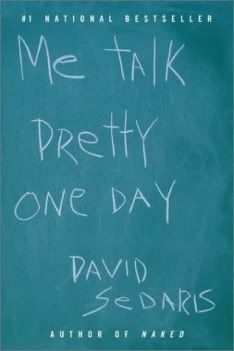 David Sedaris’s collection of essays, Me Talk Pretty One Day is divided into two parts, One and Deux, and it discusses everything from his lithping troubles as a child, to his struggles speaking French as an adult.
David Sedaris’s collection of essays, Me Talk Pretty One Day is divided into two parts, One and Deux, and it discusses everything from his lithping troubles as a child, to his struggles speaking French as an adult.Sedaris also writes about growing up in North Carolina, doing drugs in college, working odd jobs in New York, and his travels in Europe with his boyfriend. With titles like You Can’t Kill the Rooster, Jesus Shaves, and I’ll Eat What He’s Wearing, you can never be sure what to expect from a Sedaris essay; the only thing you can count on is caustic sarcasm.
In the opening essay, Go Carolina, Sedaris writes about the speech therapy sessions of his youth. He was taught by a school-appointed therapist who eventually succeeded in altering Sedaris’s speech.
Instead of correcting his lisp, however, she prompted David to stop using s words.
’Yes’ became ‘correct,’ or a military ‘affirmative.’ ‘Please,’ became ‘with your kind permission,’ questions were pleaded rather than asked, … [and] ‘Rivers’ became either ‘a river or two’ or ‘many a river’.With consistent evasion, Sedaris ducked every s possible, frustrating his therapist with comical language; much like the language found in See You Again Yesterday, an essay about Sedaris’s poor French communication skills. When inquiring about calves’ brains in a butcher’s window, Sedaris asked, “Is thems the thoughts of cows?”
When Sedaris isn’t querying butchers about bovine ideas, he is eating in swank New York restaurants that put more emphasis on presentation than flavor. After finishing dinner, Sedaris’s appetite is inadequately satisfied, yet sufficiently annoyed. “Because [he is] both a glutton and a masochist, [his] standard complaint, “That was so bad,” is always followed by “And there was so little of it!”
Sedaris’s masochist tendencies dissipate, however, when it comes to dating. He doesn’t date those who annoy him, including men who say “I can’t find my nipple ring” or “This one here was my first tattoo.” He also can’t abide people who “say they ‘discovered’ any shop or restaurant currently listed in the phone book” or those who use the words “flick, freebie, cyberspace, progressive, or zeitgeist.” Poor word choices for conversation, but great New York Times crossword stumpers. In 21 Down, Sedaris discusses his fascination with this erudite hobby:
When asked ‘What do we need to learn this for?’ any high-school teacher can confidently answer that, regardless of the subject, the knowledge will come in handy once the student hits middle age and starts working crossword puzzles in order to stave off terrible loneliness. Because it’s true.Sedaris occasionally sets aside these lonely word games in order to visit French movie theaters. Who needs Le Louvre when you can watch a film in the quiet dark? Sedaris has “never considered [himself] an across-the-board apologist for the French, but there’s a lot to be said for an entire population that never, under any circumstances, talks during the picture.”
In America, people come to the theater to talk at full volume, which is why Sedaris calls Americans “the trumpeting elephants of the human race. Questions, observations, the location of blisters and rashes – everything is delivered as though it were an announcement.” The U.S. populace discusses everything at full volume, and no topic is out of bounds. In Me Talk Pretty One Day, David Sedaris’s announcements are trumpeted with prose. Mixing humor and insight, Sedaris creates unique vignettes about every-day life, easily appreciated and often times treasured. He mixes wordplay, personal history, wit, and vulgarity to create an amusing, fast-paced reading experience, or – ath a young David Thedarith might thay - a funny, quickly-moving book.
...
Originally published in the Charleston City Paper (2001).
